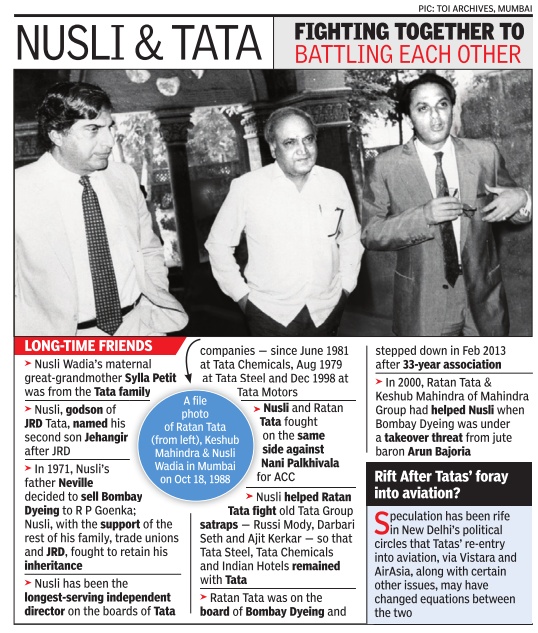Nusli Wadia
This is a collection of articles archived for the excellence of their content. |
Relationship with the Tatas
They are distantly related, and their families have been close for decades.But the long friendship between Nusli Wadia and Ratan Tata has become a casualty of the bitter conflict raging within the Tata Group. The battle lines have been clearly drawn, with the Tatas gunning for the removal of Wadia from the boards of three group companies.
Wadia, 72, a hardened veteran of many a legendary corporate war, threw his weight behind Cyrus Mistry on Thursday . As senior independent director of Tata Chemicals, he backed Mistry to remain the chairman. The Tata response was swift, and emphatic. On Friday, Tata Sons sent notices to Tata Chemicals, Tata Steel and Tata Motors to remove Wadia from their boards. Having backed Cyrus Mist ry to remain chairman of Tata Chemicals on Thurs day , Nusli Wadia again sided with him at a stormy meeting of the Tata Steel board on Friday . The board of Tata Motors is set to me et on Monday .
Wadia, chairman of Bombay Dyeing and Britannia, has served as an independent director on the board of Tata Chemicals since 1981, on the Tata Steel board since August 1979 and Tata Motors sin ce December1998.
On Friday , Tata Sons directed these three companies to call ex traordinary general meetings (EGM) to remove Wadia from his directorship. An EGM is called on a short notice to deal with an urgent matter . To remove Wadia Tata Sons requires majority sup port from the shareholders of the se companies. A Tata insider said Wadia was working in tandem with Mistry , defying the expecta tion in certain quarters that he would side with his old friend in the battle for the control of Tata Sons. “He should have supported us,“ the Tata insider said.
Sources close to Wadia, howe ver , emphasised that he was an in dependent director and could no be expected to blindly toe the Tata line. A long-time confidant of Wa dia described Tata Sons' decision to oust him from the boards as “unwarranted“. Removing a di rector requires “valid justifica tion“, especially if he has served on the board for decades, the sour ce said. Amit Tandon, founder & MD, Institutional Investor Advi sory Services, termed the move by Tata Sons to remove an inde pendent director as `unpreceden ted' in Indian corporate history . “ have not heard of any previous move when an independent di rector was removed from the bo ard,“ Tandon said.
An independent director is supposed to act in the best inter est of the company . Wadia, go ing by annual reports of the three companies, does not own a single share in any of them “The move (by the Tatas) goes very much against the concep and definition of independen directors,“ said Sandeep Pa rekh, founder, FinSec Law Advi sors. With Mistry and Wadia on one side and Ratan Tata on the other side, according to a Tata Group veteran, “the game has just got interesting“.
Wadia's connection with Ratan Tata goes beyond just friendship. Wadia's maternal great grandmother was Sylla Petit, who was the sister of JRD Tata.It was JRD who had anointed Ratan Tata as the chairman of Tata Sons in 1991. Petit and JRD's father, Ratanji Dadabhoy Tata (RD Tata), was the first cousin of Jamsetji Tata, the founder of Tata Sons. RD Tata was also a shareholder of Tata Sons.Petit had sold her portion of Tata Sons shares to Mistry's grandfather.
In 1971, Wadia's father Neville was planning to sell off Bombay Dyeing to business baron RP Goenka. However , with the help of JRD and others, Wadia fought to retain control of the company within the family . Then during the first half of the 1990s, he helped Ratan Tata fight old Tata satraps -Russi Mody , Darbari Seth and Ajit Kerkar -and assert his control over Tata Steel, Tata Chemicals and Indian Hotels. Again in 2000, Ratan Tata helped Wadia when Bombay Dyeing was under a takeover threat from Kolkatabased jute baron Arun Bajoria.
While Wadia had served on the boards of Tata companies for decades, in a reciprocal move, Ratan Tata was inducted on the board of Bombay Dyeing where he was a director for more than 33 years. It was only in early 2013 that Ratan Tata had stepped down from the textile major's board.
Apparently , the relationship between the two old friends started changing and the strain in ties became visible over the 520 domestic aviation policy . According to the rule, a domestic carrier that wants to fly international routes should have five-year domestic flying experience and 20 aircraft. Ratan Tata wanted the 520 norm to go to help AirAsia and Vistara, the two recently-floated aviation companies in which Tata Sons held majority stakes. Wadia, on the other hand, wanted the rule to stay to benefit Go Air, run by his younger son Jehangir (Jeh) -who was named after JRD (Jehangir Ratanji Dadabhoy) Tata.
